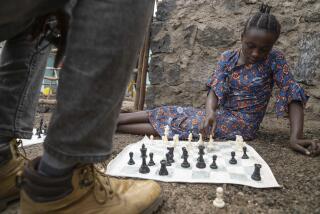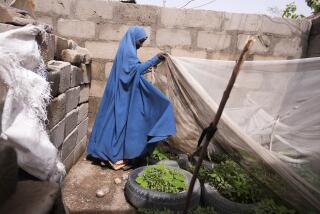Madagascar’s children face hunger, abuse and neglect
- Share via
Reporting from Antananarivo, Madagascar — The man grabs a metal bar, raises it and shouts at several boys playing on a see-saw. The boys’ faces freeze in fear. They flee.
This is a “child-friendly space.” The man is a respected community leader. And the iron bar -- or stick, fist or broom handle -- is child discipline here in Andohatapenaka 2, one of the poorest districts of Madagascar’s capital.
The man, Honore Rakotomanana, 54, doesn’t work at the center, funded and run by UNICEF. He just dropped in. But his is a typical attitude.
“Children in Madagascar aren’t like children in other countries. Here, children are really difficult,” he says. “You have to give them a warning to make them behave. These days, children are answering back to adults.”
So the communal body overseeing customary law that he represents, called the fokontany, encourages parents to beat their children.
“They shouldn’t hit them so hard as to injure them,” he says, “but should hit them to punish them.”
::
Antananarivo is a sprawl of quaint wooden houses on steep winding streets, with slabs of fly-peppered meat hanging in the sun, ancient French cars puttering about and vendors pushing rickety carts. Beggars line the sunny side of the streets.
The children in the Andohatapenaka child-friendly center are the urban poor: hungry, abused, neglected, fearful. About half are suffering malnutrition, staff say.
Hunger is probably the most serious struggle for most, because of the collapse of Madagascar’s economy after a coup and political crisis in March. The military toppled President Marc Ravalomanana and replaced him with his rival, Andry Rajoelina, then the mayor of Antananarivo. Since then, the tourist industry has shut down and many factories have closed, triggering massive unemployment.
In the wake of the coup, the United States and the European Union cut aid to Madagascar, which relies on Western assistance to cover almost half its budget. Efforts to resolve the crisis have dragged on for months; a deal on a national unity government was reached recently, but an earlier accord collapsed.
A https://reportreport for UNICEF on the effects of the political crisis and the economic collapse on the urban poor in Antananarivo found that children were troubled by abuse, violence and their parents’ sudden unemployment and struggle to find food. Some had to drop out of school for lack of money. Some had to work, or beg for food. Others joined street gangs.
“I feel very sad,” said a 13-year-old boy who was interviewed for the UNICEF report, which surveyed 12,800 children in the capital.
“Dad doesn’t have any work as he’s a tourist guide. There are no more tourists.”
Stefani Randrianangaly, the supervisor at the Andohatapenaka center, has seen the fallout from the economic collapse.
“The crisis really had an impact on the income of families. Parents can’t meet their children’s needs like food and school,” Randrianangaly says.
At the center, some of the girls look more like threadbare women than children, drawing bright pictures as babies sleep on their backs. When the children chant and sing, some of them look vague and lethargic, out of step, in their own world.
Parents are supposed to pick up the children at midday, when the center closes, but some never bother to show up, staff members say.
A 10-year-old boy at the center, Njakatiana, was abandoned by his mother after the crisis and was left with his disabled, elderly grandfather. He has to beg for food from neighbors.
At the center he is aggressive and isolated.
He often cries, saying he misses his mother -- even though the boy’s family seems to have been troubled and violent, staff members say.
He stands, with a ragged cap and filthy bare feet, next to an old lady from the neighborhood whom he relies on. He calls her his grandmother. But she says, “This is not my child. He’s a neighbor.
“If there’s something to eat, we eat. If there’s nothing to eat, we eat nothing,” she says simply.
::
As they grow older, the sense of anger hardens for some young Madagascans.
Some gang members interviewed for the UNICEF report described the thrill of knowing they can scare people.
But other young people expressed impotent disgust at their lives.
“People say life in urban areas is better because we have food and jobs,” said one angry 15-year-old youth. “Why don’t they come and see for themselves? This is not life. Could you live here?
“Who cares if I die? I am not alive anyway.”
More to Read
Sign up for Essential California
The most important California stories and recommendations in your inbox every morning.
You may occasionally receive promotional content from the Los Angeles Times.










